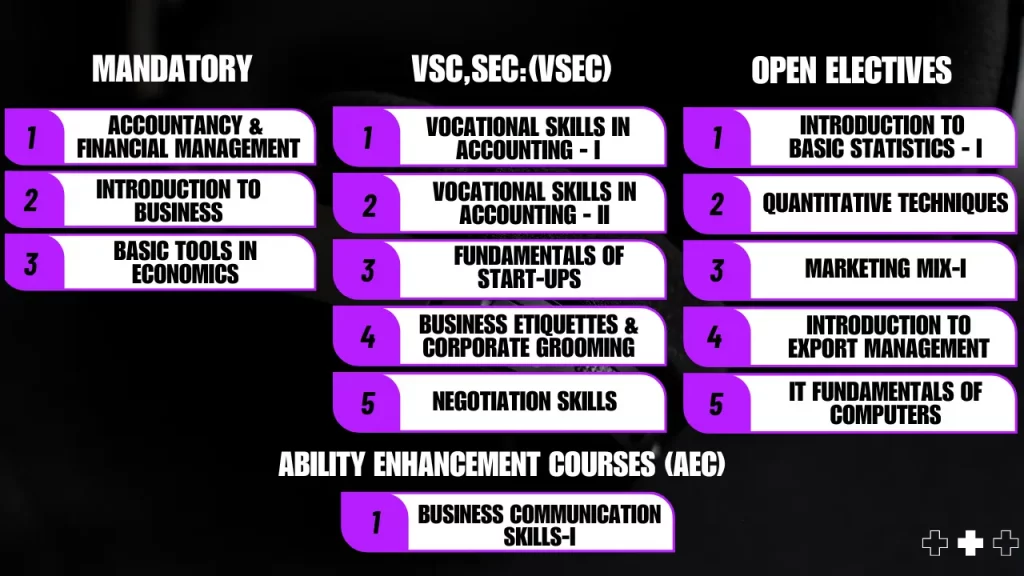FYBCOM Syllabus – Mumbai University 2025-26 (As per NEP 2020) | Download Free Pdf
Table of Contents
FYBCOM Syllabus

FYBCOM SEM 1 Subjects
FYBCOM SEM 1 – Mandatory Subjects (Compulsory)
- Accountancy & Financial Management
- Introduction to Business
- Basic Tools in Economics
VSC, SEC:(VSEC)
- Vocational Skills in Accounting – I
- Vocational Skills in Accounting – II
- Business Etiquette & Corporate Grooming
- Negotiation Skills
- Fundamentals of Start-ups
- Commercial Mathematics
- Economics For Professional Careers – I
- Practical Statistics For Commerce – I
- Foundation of Behavioral Skills
Open Electives
- Introduction to Basic Statistics – I
- Quantitative Techniques
- Marketing Mix – I
- Introduction to Export Management
- IT Fundamentals of Computers
Ability Enhancement Courses (AEC)
- Business Communication Skills – I
Indian Knowledge System Series (IKS)
Introduction to Cultural Activities

FYBCOM SEM 2 Subjects
FYBCOM SEM 2 – Mandatory Subjects (Compulsory)
- Accountancy & Financial management
- Introduction to Business
- Basic Tools in Economics
VSC, SEC:(VSEC)
- Vocational Skills in Accounting – I
- Vocational Skills in Accounting – II
- Business Etiquette & Corporate Grooming
- Negotiation Skills
- Fundamentals of Start-ups
- Commercial Mathematics
- Economics For Professional Careers – I
- Foundation of Behavioral Skills
Open Electives
- Introduction to Basic Statistics – I
- Quantitative Techniques
- Marketing Mix – I
- Introduction to Export Management
- IT Fundamentals of Computers
Ability Enhancement Courses (AEC)
- Business Communication Skills – I
Indian Knowledge System Series (IKS)
Introduction to Cultural Activities
Accountancy & Financial Management – I
- Chapter 1: Introduction to Accounting Concepts and Accounting Standards
- Accounting Concepts and Conventions
- Meaning and Classification – Capital, Revenue: Expenditure and Receipts, Profit and Loss
- Accounting Standard (AS) and Ind-AS and IFRS – An Introduction, Concepts and Benefits
- AS-1: Disclosure of Accounting Policies
- AS-2: Valuation of Inventories
- AS-9: Revenue Recognition
- Inventory Valuation and Experiential Learning – Physical Stock Taking Activity and Recording
- Practical Problems on Preparation of Stock Ledger Account using First in First Out (FIFO Method) and Weighted Average Cost Method
- Short Practical Problems on Valuation of Inventory as per AS 2
- Chapter 2. Final Accounts of Manufacturing Concern
- Introduction and Meaning
- Final Accounts of Manufacturing Concern (Proprietary Firm)
- Closing and Adjustment Entries in Final Accounts of Manufacturing Concern
- Preparation of Trading Account, Manufacturing Account, Profit and Loss Account, and Balance Sheet
(Note: For the Semester Examination, not more than 5 adjustments are to be asked in one practical problem.)
- FYBCOM Books PDF (Idol Students)
- SYBCOM Books PDF (Idol Students)
- TYBCOM Books PDF (Regular and Idol Students)
Commerce I
(Introduction to Business)
- Unit 1: Business and Business Environment
- Business
- Business Environment
- Unit 2: Project Planning and Business Strategies
- Project Planning
- Business Strategy
Basic Tools in Economics
- Module – I: Introduction to Basic Tools
- Variables: Meaning, Types, Importance, and Use
- Ceteris Paribus: Meaning, Significance, and Use
- Function: Meaning, Types, Importance, and Use
- Equations: Meaning, Types, Significance, and Use
- Identities: Meaning, Types, Importance, and Use
- Module – II: Graphs and Tables
- Graphs and Diagrams: Meaning, Types, Features, Importance, and Use
- Lines and Curves: Meaning, Types, Importance, and Use
- Slope: Meaning, Types, Importance, and Use
- Tables and Schedules: Meaning of a Table, Characteristics of a Table, Use or Importance of Tables
Vocational Skills in Accounting – I
- Module – 1:
- Meaning and Concept of “Person” under Income Tax Law, GST Law, Udyam
- Application and Registration Procedure of Digital Signature.
- PAN & TAN Application for Business Under The Income Tax Act, 1961.
- Business Registration under UDYAM / UDYOG AADHAR.
- Business Registration under Goods and Service Tax Laws.
- Module – 2:
- Registration of Business Under The Maharashtra State Tax on Professions, Trades, Callings and Employments Acts, 1975.
- Business Registration under The Employees’ Provident Funds and Miscellaneous Provisions Act, 1952.
- Business Registration under The Employees’ State Insurance Act, 1948.
Note: The above modules will cover the applicability and registration of individuals and partnership firms.
Vocational Skills in Accounting – II
- Module 1:
- Registration Procedure as Required under The Food Safety and Standards Act, 2006
- Registration Procedure of Importer Exporter Code under The Foreign Trade (Development and Regulation) Act, 1992
- Registration Procedure of Partnership Firms under The Partnership Act, 1932
- Module 2:
- Registration Procedure of Limited Liability Partnership under The Limited Liability Partnership Act, 2008
- Registration Procedure of Companies under The Companies Act, 2013 (Private Limited Companies only)
- Meaning and Concepts of Business Start-ups and UNICORNS
- Department for Promotion of Industry and Internal Trade (DPIIT) – Start-up Recognition – G.S.R. Notification 127(E)
Business Etiquette & Corporate Grooming
- Unit 1: Business Etiquettes
- Business Etiquettes: Concept, Principles, Significance of Business Etiquettes in 21st Century, Professional Advantage; Need and Importance of Professionalism, Minimum Standards Required by Etiquette Practice
- Workplace Etiquette, E-Mail Etiquette, Telephone Etiquette, Dining Etiquette, Meeting Etiquette, and Presentation Etiquettes
- Pedagogical Approach: Lecture Method, Role Play and Assignments
- Unit 2: Corporate Grooming
- Corporate Grooming: Concept, Hygiene and Grooming Guide – Posture and Gesture – Yes’s and No’s of Grooming, Appearance and Attire, Clothes Encounters – Gauge in Brain (Formal vs Informal), Connecting and Building Rapport – Listening Skills, Conversational Skills, Body Language
- Emotional Intelligence: Importance, Concept, Theory and Measurements.
- Stress Management: Strategies for Preventing and Relieving Stress.
- Time Management: Meaning, Techniques, and Styles
- Pedagogical Approach: Lecture Method, Case Study, and Role Play
Negotiation Skills
- Unit 1: Negotiation and Types of Negotiations
- Negotiation: Concept, Key Negotiation Concepts, Perception and Cognition in Negotiation, Negotiation Process, Conflict and Negotiation Strategy
- Types: Distributive Negotiation; Integrative Negotiation; Multiple Phases and Multiple Parties, Preparation for a Deal; Table Tactics; Frequently asked Tactical Questions; Barriers to Agreement; and Mental Errors in Reaching an agreement.
- Pedagogical Approach: Lecture Method, Case Study, and Assignments
- Unit 2: Negotiation Skills
- Negotiation Skills – Negotiating as an Organizational Capability; Skills of an Effective Negotiator, Negotiation and IT; Ethics in Negotiation; Cultural Differences in Negotiation Styles; Gender in Negotiations; Context of Mediation; Negotiation as Persuasion
- Developing Power, Decision Trees, Psychological Tools. Practical Practice of Negotiation
- Pedagogical Approach: Lecture Method, Case Study, and Role Play
Fundamentals of Start-ups
- Module 1: Start-up Opportunities
- The New Industrial Revolution: The Big Idea – Generate Ideas with Brainstorming – Business Start-up – Ideation – Venture Choices – The Rise of the Start-up Economy
- The Six Forces of Change: The Start-up Equation,
- The Entrepreneurial Ecosystem: Entrepreneurship in India, Government Initiatives
- Pedagogical Approach: Lecture Method, Case Study, and Assignments
- Module 2: Start-up Capital Requirements and Legal Environment
- Identifying Start-up Capital Resource Requirements, Constructing a Process Map, and Approval for New Ventures
- Funding Strategies with Bootstrapping, Crowd Funding, Preparation of Start-up Project Report
- Pedagogical Approach: Lecture Method, Case Study, and Hands-on Project Report
Commercial Mathematics
- Module 1: Commission, Brokerage, Discount and Partnership
- Commission and Brokerage
- Discounts
- The mixture of Discount and Profit
- Module 2: Shares and Mutual Funds
- Concepts of Shares, Face Value, Market Value, Dividend, Equity Shares, Preferential Shares, Bonus Shares, Examples
- Mutual Funds, Problems on Calculation of Net Income after considering Entry Load, Dividend, Change in Net Asset Value (N.A.V.) and Exit Load
- Averaging of Price under the ‘Systematic Investment Plan (S.I.P)’
- Students are encouraged to use Excel to solve practical problems.
Business Communication Skills – I
- Module 1: Introducing the Theory of Business Communication
- Concept of Communication
- Communication at the Workplace
- Impact of Digital Technology on Communication
- Module 2: Business Correspondence
- Parts of a Business Letter
- Job Application with Bio-data
- Letter of Appointment
- Letter of Appreciation
- Letter of Resignation
- E-mails: Job Application via Email
- Writing and Responding to Official Emails
Economics For Professional Careers – I
- Module – 1: Business Economics and Demand
- Meaning, Scope, and Importance of Business Economics, Basic Problems of an Economy and Role of Price Mechanism
- Meaning and Determinants of Demand, Law of Demand, Increase and Decrease in Demand, and Expansion and Contraction of Demand
- Module – 2: Consumer’s Behaviour and Supply
- Theory of Consumer’s Behaviour Marshallian Approach and Indifference Curve Approach
- Meaning and Determinants of Supply, Law of Supply, and Elasticity of Supply
Practical Statistics For Commerce – I
- Module 1: Measures of Central Tendency and Dispersion
- Concept of Measures of Central Tendency. The basic measures of central tendency, such as Mean, Median, and Mode, for raw data
- Grouped Data and measures of central tendency for grouped data for a discrete random variable
- Mean, Median, and Mode for Continuous random variable
- Measures of dispersion, such as Range, Coefficient of Range, Variance, and Standard Deviation
- Module 2: Decision Theory
- Decision-making situation; Decision maker, Courses of Action, States of Nature Pay-off, and Pay-off matrix
- Decision making under Uncertainty: Maximin, Maximax, and Laplace criteria, simple examples to find an optimum decision.
- Decision making under Risk Expected Monetary Value (EMV), Decision Tree, simple examples based on EMV and EOL
You can download the FYBCOM Syllabus from the link below.


